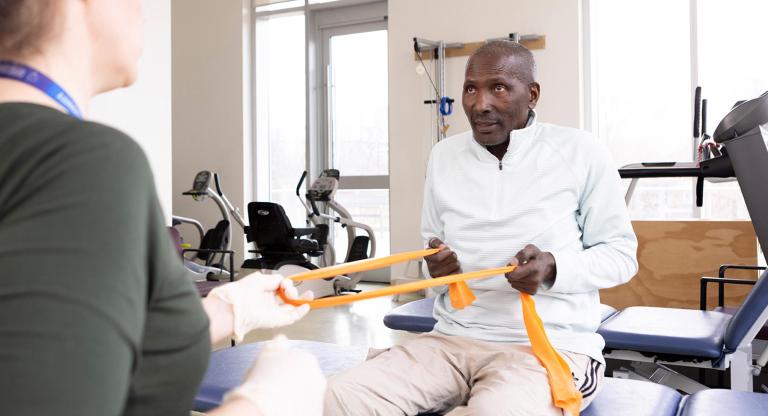M is for men: tips for healthy aging

Indiana Jones, the fictional archaeology professor-adventurer declared, it’s not the years…it’s the mileage. Aging well, is likely a bit of both.
“Living healthy as you age has daily and long-term benefits,” says Dr. Adam Millar, an endocrinologist and andrologist at Mount Sinai Hospital’s Murray Koffler Urologic Wellness Centre which specializes in providing comprehensive men’s health services.
He provides suggestions on three key areas:
Motion for muscle mass and metabolism
“There is a change in the metabolic make-up of the body as those processes slow down. There is also less muscle mass as men age. By your eighties, muscle represents only twenty-five to thirty percent of body weight. This naturally occurs as a result of altered hormone production and reduced physical activity,” says Dr. Millar.
He recommends men stay active to maintain muscle mass. “Some men are predisposed to medical conditions such as diabetes as they age, and having more muscle mass has been shown to significantly lower risk,” he adds.
Aerobic or endurance exercises and strength training can help keep up one’s metabolic rate and muscle mass.
Maintain a moderate body weight
“Eating well helps maintain a healthy body weight and reduces excess fat,” says Dr. Millar.
“Men generally have higher daily caloric intake and alcohol consumption as compared to women. We know that too much alcohol is unhealthy and thus moderation is key. Knowing what to eat and in what quantities can be beneficial in maintenance of a healthy body weight.”
Researchers are studying obesity and effects on testosterone levels. Studies show this complex and chronic condition, through different mechanisms can lead to decreased testosterone production in men of all ages.
More moments to discuss mental health and sexual health
“There is more recognition that men struggle with mental health and sexual health. They are often reluctant communicators and that challenge can feel more magnified in the struggle to admit they could benefit from a discussion with their doctor. At the same time, health care providers need to continue normalizing the environment to encourage more dialogue with patients,” says Dr. Millar.
There is evidence that testosterone levels decline with age in all men, at about 1% to 3 % per year. However, distinguishing which symptoms are due to declining testosterone level is not straightforward. Symptoms classically associated with low testosterone in older men, such as decreased energy, low sex drive and sexual function, may actually be the result of mental health or other pre-existing medical conditions that tend to increase in incidence as men age.
“Everything is connected. Staying active, eating well, maintaining a healthy body weight, and taking care of your mental and sexual health, can all increase one’s sense of well-being and potentially prevent development of diabetes and low testosterone,” says Dr. Millar.












